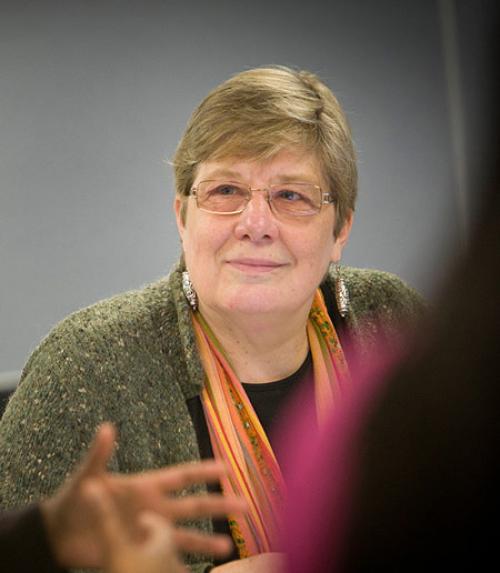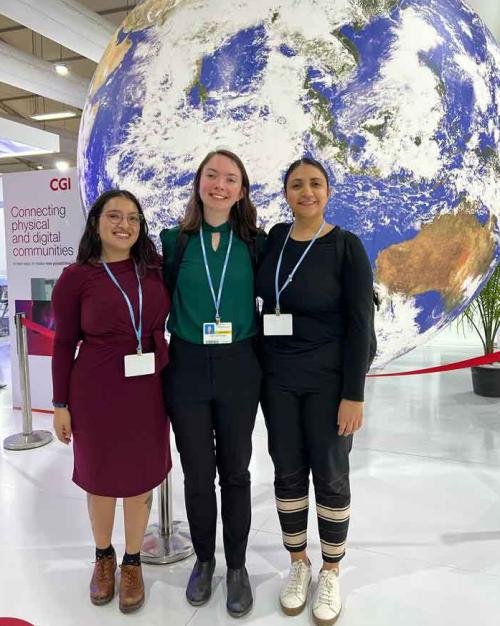Arts and Sciences students Arden Podpora ’23 and Eva Fenningdorf ’23 returned from the 27th Conference of the Parties of the United Nations Framework Convention on Climate Change (COP27) enthusiastic about an agreement that countries will pay for the damage that climate change causes to poorer countries.
“This was certainly something we had discussed in class and were hopeful of happening, but even during COP27 it looked uncertain whether the fund would actually be established,” Podpora said. “One of our groups in class spent the semester researching loss and damage and developing recommendations for COP27.”
“There is still so far to go on this topic,” Fenningdorf said. “Parties agreed to set up a fund according to the Santiago Network, but the specifics have not been fleshed out and specific dollar amounts have not yet been established. The idea of compensation for developing countries goes back to a theme common in many environmental classes, which is the importance of environmental justice. Climate change professionals have begun to prioritize a ‘just transition’ which would require reparations such as the one outlined in this COP.”
The students, two of eight Cornell students who attended COP27, are part of the Engaged Cornell course EAS 4443 (Global Climate Change Science and Policy), which introduces students to climate change science and policy. The students learned how science factors into the convention and how COP negotiations take place. Podpora is double majoring in economics and environment and sustainability, while Fenningdorf is double majoring in French and environment and sustainability.
During COP27, Podpora and Fenningdorf helped with Cornell’s exhibit and other side events, as well as attended various sessions and workshops. Podpora attended a discussion about nuclear power as an important tool for climate action.
“Nuclear was certainly a highlight at COP27, with promising developments like Small Modular Reactors (SMRs) on the not-so-distant horizon,” she said. “All of the Cornell COP27 faculty delegates are leaders in their fields and are on the forefront of new climate-related technologies and methodologies, from hydrogen turbines to soil health.”
Cornell’s exhibit delegation highlighted the Cornell 2030 project and explored faculty research on the topic. Fenningdorf spoke with conference attendees, explained the exhibit and answered questions. She also participated in a press conference with Katherine Bunting-Howarth, associate director of New York’s Sea Grant and associate director of Cornell Cooperative Extension, focused on the relationship between oceans and climate change. Fenningdorf spoke about her project this semester on the Ocean Dialogue, a discussion about projects such as Colombia’s Cispata blue carbon project and how they can be made more effective. Blue carbon is carbon captured by the world's ocean and coastal ecosystems.
Although Podpora and Fenningdorf said the conference didn’t make them more optimistic about the way the world is tackling climate change, they said voting is the best and most important method for the average person to fight climate change.
“There seems to be a general global consensus that something needs to be done,” Fenningdorf said. “I felt optimistic about the U.S.'s role in combating the climate crisis as Biden gave a speech where he committed to reaching our goals laid out in the Paris Agreement — which is not ambitious enough in my opinion but half of the country doesn't believe in climate change, so it’s pretty good — and reducing emissions by 50 percent by 2030. The most important thing that Americans can do is vote. If we elect people that care about climate change and do our part, we can make a big difference in the global landscape.”
“COP27 is a forum for discussion, negotiation and fueling ambition, but big words at a climate conference mean very little without implementation back at home,” Podpora said. “In democratic countries like the U.S. that means ensuring the political administration in power shares our concern for climate change and desire for action, so activism and voting are crucial in achieving real progress.”





